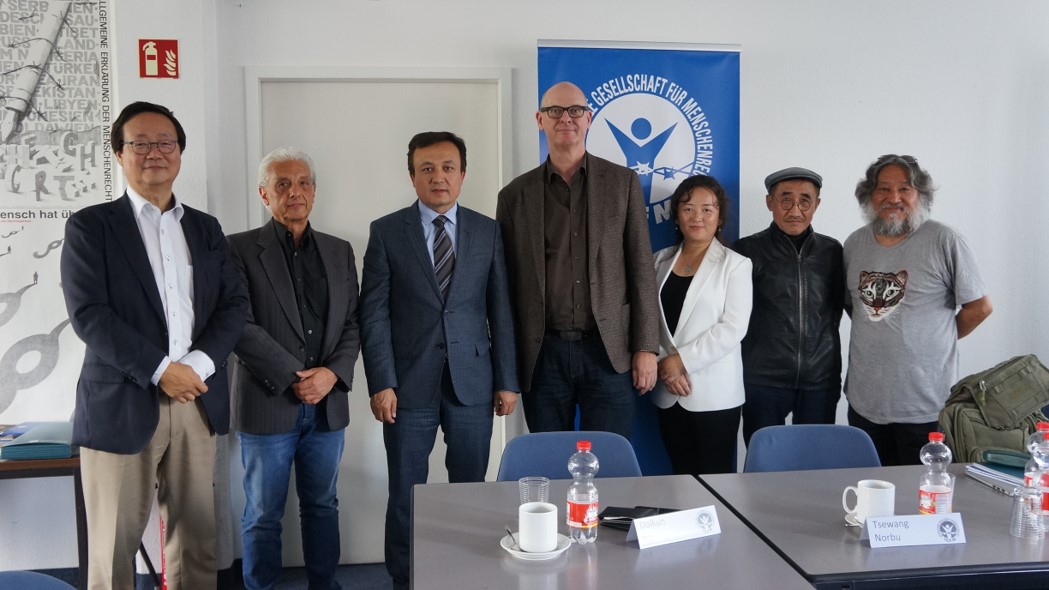WUC General Secretary Speaks at IGFM Press Conference

World Uyghur Congress, 8 September 2017
 On 7 September 2017, the General Secretary of the World Uyghur Congress, Dolkun Isa, spoke at a press conference entitled “Is China a partner for democratic states?”. The press conference was organized by the International Society for Human Rights (IGFM) and held at their offices in Frankfurt, Germany. It brought together human rights activists to discuss the numerous human rights violations occurring in China and how China has increasingly been using its economic might to silence criticism of its human rights record.
On 7 September 2017, the General Secretary of the World Uyghur Congress, Dolkun Isa, spoke at a press conference entitled “Is China a partner for democratic states?”. The press conference was organized by the International Society for Human Rights (IGFM) and held at their offices in Frankfurt, Germany. It brought together human rights activists to discuss the numerous human rights violations occurring in China and how China has increasingly been using its economic might to silence criticism of its human rights record.
Dolkun Isa spoke at the conference on how “the long arm of the People’s Republic of China endangers human rights defenders in Europe”. In this speech, he discussed how the Chinese government has been targeting and harassing human rights activists speaking about the human rights situation outside China. Isa argued that China has been taking steps to silence critics and portray them as criminals. He gave his own experiences of being briefly detained in Italy and ejected from the UN Permanent Forum on Indigenous Issues as examples of China using its growing influence to harass and silence human rights defenders in foreign countries. Isa concluded by noting how the Chinese government was using its power and influence to pressure other countries to return Uyghur asylum seekers and refugees back to China, in direct violation of international law.
Read the speech in full:
“I would like to speak about the influence that the Chinese government has far beyond its borders. As a Uyghur human rights activist, I feel the pressure from China constantly in my work.
I will argue that it is important that the Chinese government has been taking steps to silence critics and portray them as criminals, as China has done with me. It makes my life and the lives of Chinese rights activists difficult, but it is encouraging that China feels threatened by us.
It is a sign that we have made a big impact on how Chinese leaders feel about criticism and how they take it so personally. If the Chinese government didn’t try hard to silence us all, we would probably be doing something wrong.
In my own experience, the pressure has been increasing in Europe. I have been a German citizen for many years, but even now China causes problems for me.
I travelled to Italy this past summer in July to speak at the Italian Senate about Uyghur human rights, but I was stopped by Italian police and taken for questioning for three hours.
I have been to Italy in the past, but never experienced this problem, which shows us that the pressure is growing on European countries.
Before this, I have experienced harassment and intimidation in Geneva at the UN Human Rights Council. The Chinese mission there is constantly complaining about my presence there whenever I go. I think this also shows that we are doing good work there and this threatens and bothers China.
I was at the UN in New York in April to attend the Permanent Forum on Indigenous Issues and after two days there, I was approached by UN security on the third day and asked to leave, with no reason. We have asked ECOSOC and the leaders of the Forum to give us an answer, but still have not received one.
I have also had some trouble travelling to countries with close connections to China like South Korea, Taiwan and India in the past.
Though it’s not just me and human rights activists that have been targeted recently.
The Chinese government has also been very active in the last few years trying to force Uyghurs who have left China to return home. We have seen many cases in the last 20 years that show this very clearly. In some prominent cases, 20 Uyghurs were returned from Cambodia in 2009 because of the pressure from the Chinese government. Only a week after the Uyghurs were returned, China signed trade deals amounting to 1 billion US dollars.
More recently in 2015, 109 Uyghur refugees who were detained in Thailand were illegally returned to China. China and these countries continue to ignore international law on this issue and so does the international community. Refugees who have legitimate fears of persecution in their home countries cannot be sent back.
Uyghurs who have been returned to China for years have disappeared into China’s prison systems because the Chinese government has labelled all of these people as criminals.
Things have gotten even worse in 2017. Since the end of January, thousands of Uyghur students studying abroad have been forced home by the Chinese government. So far, students studying in Egypt, Turkey, France, Australia, and the United States have already been affected by the orders, but the case has been particularly alarming for Uyghur students in Egypt since the end of June.
12 Uyghur students were forcibly deported to China on July 6, from Cairo’s airport after attempting to flee to Turkey. Amnesty International also reported that another 10 Uyghurs were forced to return to China in the middle of July from detention centers in Cairo.
Close to 200 Uyghur students are still detained in Egypt and may be returned if the international community stays silent.
If the international community does not begin to recognize how China is manipulating countries around the world in this way, Uyghurs and Chinese people will continue to suffer.”

